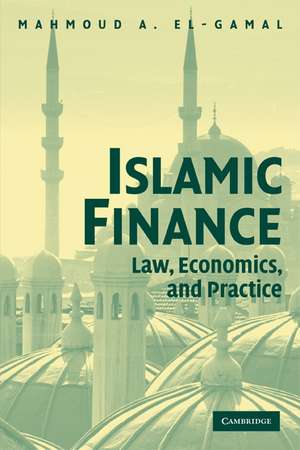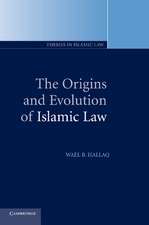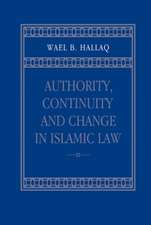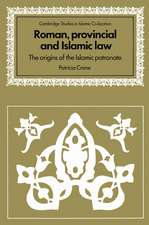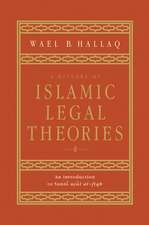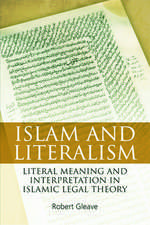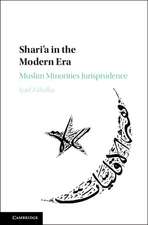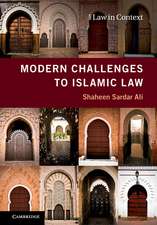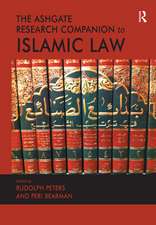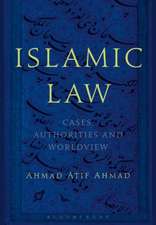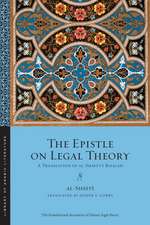Islamic Finance: Law, Economics, and Practice
Autor Mahmoud A. El-Gamalen Limba Engleză Paperback – 23 noi 2008
| Toate formatele și edițiile | Preț | Express |
|---|---|---|
| Paperback (1) | 290.28 lei 6-8 săpt. | |
| Cambridge University Press – 23 noi 2008 | 290.28 lei 6-8 săpt. | |
| Hardback (1) | 695.79 lei 6-8 săpt. | |
| Cambridge University Press – 2 iul 2006 | 695.79 lei 6-8 săpt. |
Preț: 290.28 lei
Nou
Puncte Express: 435
Preț estimativ în valută:
55.55€ • 57.92$ • 46.17£
55.55€ • 57.92$ • 46.17£
Carte tipărită la comandă
Livrare economică 20 martie-03 aprilie
Preluare comenzi: 021 569.72.76
Specificații
ISBN-13: 9780521741262
ISBN-10: 0521741262
Pagini: 240
Ilustrații: 3 tables
Dimensiuni: 153 x 228 x 15 mm
Greutate: 0.36 kg
Ediția:1
Editura: Cambridge University Press
Colecția Cambridge University Press
Locul publicării:New York, United States
ISBN-10: 0521741262
Pagini: 240
Ilustrații: 3 tables
Dimensiuni: 153 x 228 x 15 mm
Greutate: 0.36 kg
Ediția:1
Editura: Cambridge University Press
Colecția Cambridge University Press
Locul publicării:New York, United States
Cuprins
1. Introduction; 2. Jurisprudence and arbitrage; 3. Two major prohibitions: Riba and Gharar; 4. Sale-based Islamic finance; 5. Derivative-like sales: Salam, Istisma' and 'Urbun; 6. Leasing, securitization and Sukuk; 7. Partnerships and equity investment; 8. Islamic financial institutions; 9. Governance and regulatory solutions in mutuality; 10. Beyond Shari'a arbitrage; Conclusion.
Recenzii
'This book is by far one of the best that has been published on the topic of Islamic finance and banking.' Choice Magazine, Outstanding Academic Title, 2007
'Islamic Finance is a fine work of scholarship. It will be controversial. It exposes the irrationality and inefficiency of Shari'a arbitrating prevalent in 'Islamic finance' and proposes a fundamental reform in Islamic financial practices. This book is also a valuable manual for those who need to understand the intricacies of Islamic financial practices and the Islamic jurisprudential justifications for them. This book is an important contribution to the modern understanding of Islam.' Sohrab Behdad, Denison University
'Professor El-Gamal's book contains a comprehensive and thought-provoking discussion of the evolution of the practice of 'Islamic finance.' His call for substituting the 're-engineering' financial mindset with a more forward-looking one is provocative, well researched, and likely to stimulate many debates in academic and financial circles.' Mohamed El-Erian, Harvard Management Company,
'Islamic Finance: Law, Economics, and Practice is a landmark in our understanding of the origin, implications, and future of Islamic finance. It is a must-read for anyone interested in the institutional roots of economic outcomes in the Muslim world, why they persist, and how these outcomes can be improved upon in a manner consistent with Islam.' Avner Greif, Stanford University
'Over the past half-century the 'Islamic finance' sector has generally aimed to replicate the functions of secular financial institutions through contractual forms identified with medieval Islam. In this elegant book, which combines deep historical erudition with analytical sophistication, Mahmoud El-Gamal offers an alternative to the established form-oriented approach. The book's readers will come away with a new and refined understanding of the constraints that Islam imposes on financial relations.' Timur Kuran, University of Southern California
'The first book on Islamic finance written in the law and economics tradition, Professor El-Gamal's contribution adds a new dimension to the ongoing debate on the future of the Islamic financial industry. Whatever the reader's judgment, the gain in insight is certain, and that matters most. Those eager to see the full potential of Islamic finance realized, and the provisions in classical Islamic jurisprudence relating to finance given new interpretations that help universalize them, can hardly miss reading this book.' Mohammed Nejatullah Siddiqi, Former Director, Institute of Islamic Studies, Aligarh Muslim University
'Islamic Finance is a fine work of scholarship. It will be controversial. It exposes the irrationality and inefficiency of Shari'a arbitrating prevalent in 'Islamic finance' and proposes a fundamental reform in Islamic financial practices. This book is also a valuable manual for those who need to understand the intricacies of Islamic financial practices and the Islamic jurisprudential justifications for them. This book is an important contribution to the modern understanding of Islam.' Sohrab Behdad, Denison University
'Professor El-Gamal's book contains a comprehensive and thought-provoking discussion of the evolution of the practice of 'Islamic finance.' His call for substituting the 're-engineering' financial mindset with a more forward-looking one is provocative, well researched, and likely to stimulate many debates in academic and financial circles.' Mohamed El-Erian, Harvard Management Company,
'Islamic Finance: Law, Economics, and Practice is a landmark in our understanding of the origin, implications, and future of Islamic finance. It is a must-read for anyone interested in the institutional roots of economic outcomes in the Muslim world, why they persist, and how these outcomes can be improved upon in a manner consistent with Islam.' Avner Greif, Stanford University
'Over the past half-century the 'Islamic finance' sector has generally aimed to replicate the functions of secular financial institutions through contractual forms identified with medieval Islam. In this elegant book, which combines deep historical erudition with analytical sophistication, Mahmoud El-Gamal offers an alternative to the established form-oriented approach. The book's readers will come away with a new and refined understanding of the constraints that Islam imposes on financial relations.' Timur Kuran, University of Southern California
'The first book on Islamic finance written in the law and economics tradition, Professor El-Gamal's contribution adds a new dimension to the ongoing debate on the future of the Islamic financial industry. Whatever the reader's judgment, the gain in insight is certain, and that matters most. Those eager to see the full potential of Islamic finance realized, and the provisions in classical Islamic jurisprudence relating to finance given new interpretations that help universalize them, can hardly miss reading this book.' Mohammed Nejatullah Siddiqi, Former Director, Institute of Islamic Studies, Aligarh Muslim University
Notă biografică
Descriere
This book provides an overview of the practice of Islamic finance.
